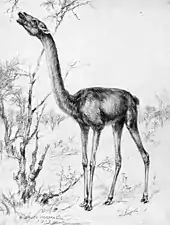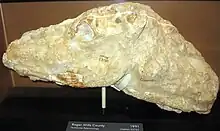Procamelus
Procamelus is an extinct genus of camel endemic to North America. It lived from the Middle to Late Miocene 16.3—5.3 mya, existing for approximately 11 million years.[1] The name is derived from the Greek πρό,[2] meaning "before" or denoting priority of order, and κάμελος ("camel"),[3] thus meaning "fore-camel", "early camel" or "predecessor camel".

| Procamelus | |
|---|---|
 | |
| Mummified Procamelus head | |
| Scientific classification | |
| Domain: | Eukaryota |
| Kingdom: | Animalia |
| Phylum: | Chordata |
| Class: | Mammalia |
| Order: | Artiodactyla |
| Family: | Camelidae |
| Tribe: | Camelini |
| Genus: | †Procamelus Leidy, 1858 |
| Type species | |
| Procamelus occidentalis Leidy 1858 | |
| Species | |
| |
| Synonyms | |
| |
It had long legs designed for speed, and was about 1.3 metres (4.3 ft) in height at the shoulder, slightly smaller than a modern llama. Unlike modern camelids, it had a pair of small incisor teeth in the upper jaw. The remaining teeth were large and adapted for eating tough vegetation. The shape of the toes suggests that it possessed foot pads, like modern camels, unlike earlier forms of camelid, which generally had hooves. This would have helped it walk over relatively soft ground.[4] It had a straighter neck than Oxydactylus or Aepycamelus.
References
- Procamelus at fossilworks
- πρό. Liddell, Henry George; Scott, Robert; A Greek–English Lexicon at the Perseus Project
- κάμελος. Liddell, Henry George; Scott, Robert; A Greek–English Lexicon at the Perseus Project
- Palmer, D., ed. (1999). The Marshall Illustrated Encyclopedia of Dinosaurs and Prehistoric Animals. London: Marshall Editions. p. 275. ISBN 1-84028-152-9.